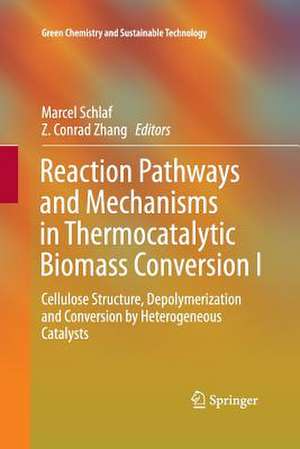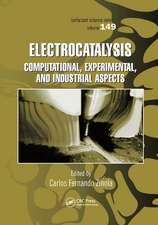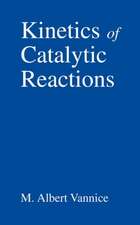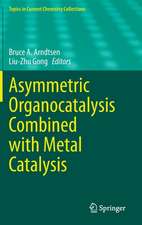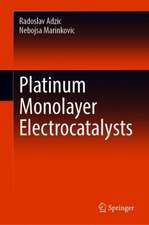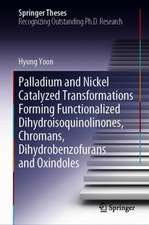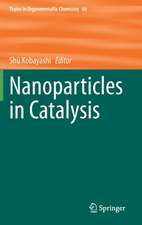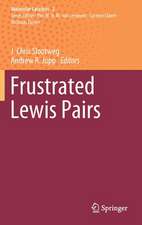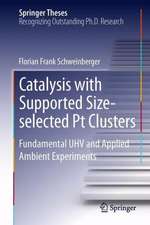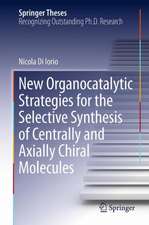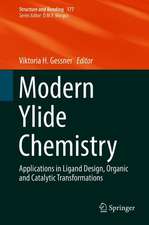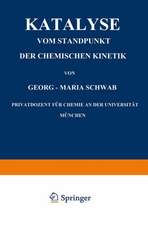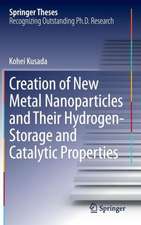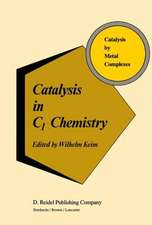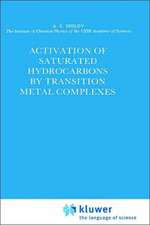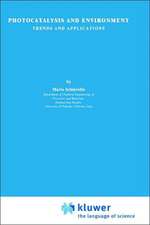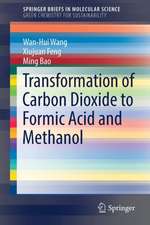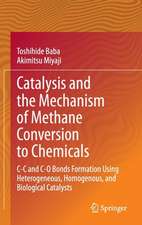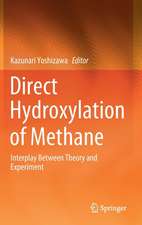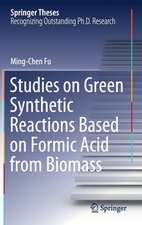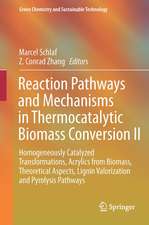Reaction Pathways and Mechanisms in Thermocatalytic Biomass Conversion I: Cellulose Structure, Depolymerization and Conversion by Heterogeneous Catalysts: Green Chemistry and Sustainable Technology
Editat de Marcel Schlaf, Z. Conrad Zhangen Limba Engleză Paperback – 23 aug 2016
Marcel Schlaf, PhD, is a Professor at the Department of Chemistry, University of Guelph, Canada.
Z. Conrad Zhang, PhD, is a Professor at the Dalian Institute of Chemical Physics, Chinese Academy of Sciences, China.
| Toate formatele și edițiile | Preț | Express |
|---|---|---|
| Paperback (1) | 639.25 lei 6-8 săpt. | |
| Springer Nature Singapore – 23 aug 2016 | 639.25 lei 6-8 săpt. | |
| Hardback (1) | 649.22 lei 3-5 săpt. | |
| Springer Nature Singapore – 5 oct 2015 | 649.22 lei 3-5 săpt. |
Din seria Green Chemistry and Sustainable Technology
- 15%
 Preț: 653.00 lei
Preț: 653.00 lei - 15%
 Preț: 648.24 lei
Preț: 648.24 lei - 18%
 Preț: 1127.28 lei
Preț: 1127.28 lei - 15%
 Preț: 697.32 lei
Preț: 697.32 lei - 15%
 Preț: 664.61 lei
Preț: 664.61 lei - 18%
 Preț: 1123.50 lei
Preț: 1123.50 lei - 18%
 Preț: 1407.46 lei
Preț: 1407.46 lei - 15%
 Preț: 649.39 lei
Preț: 649.39 lei - 18%
 Preț: 948.92 lei
Preț: 948.92 lei - 17%
 Preț: 394.87 lei
Preț: 394.87 lei - 15%
 Preț: 649.22 lei
Preț: 649.22 lei - 18%
 Preț: 1116.26 lei
Preț: 1116.26 lei - 15%
 Preț: 650.86 lei
Preț: 650.86 lei - 18%
 Preț: 1009.40 lei
Preț: 1009.40 lei - 15%
 Preț: 643.99 lei
Preț: 643.99 lei - 18%
 Preț: 1234.94 lei
Preț: 1234.94 lei - 18%
 Preț: 1224.85 lei
Preț: 1224.85 lei - 18%
 Preț: 782.42 lei
Preț: 782.42 lei - 18%
 Preț: 995.34 lei
Preț: 995.34 lei - 24%
 Preț: 1060.06 lei
Preț: 1060.06 lei - 15%
 Preț: 641.03 lei
Preț: 641.03 lei - 15%
 Preț: 653.00 lei
Preț: 653.00 lei - 15%
 Preț: 659.35 lei
Preț: 659.35 lei - 18%
 Preț: 995.17 lei
Preț: 995.17 lei - 18%
 Preț: 1118.93 lei
Preț: 1118.93 lei - 15%
 Preț: 642.36 lei
Preț: 642.36 lei - 18%
 Preț: 955.08 lei
Preț: 955.08 lei - 15%
 Preț: 643.34 lei
Preț: 643.34 lei - 15%
 Preț: 653.14 lei
Preț: 653.14 lei - 18%
 Preț: 954.77 lei
Preț: 954.77 lei - 18%
 Preț: 1008.60 lei
Preț: 1008.60 lei - 15%
 Preț: 648.42 lei
Preț: 648.42 lei -
 Preț: 397.38 lei
Preț: 397.38 lei - 15%
 Preț: 651.84 lei
Preț: 651.84 lei
Preț: 639.25 lei
Preț vechi: 752.06 lei
-15% Nou
Puncte Express: 959
Preț estimativ în valută:
122.34€ • 127.25$ • 100.100£
122.34€ • 127.25$ • 100.100£
Carte tipărită la comandă
Livrare economică 14-28 aprilie
Preluare comenzi: 021 569.72.76
Specificații
ISBN-13: 9789811013164
ISBN-10: 9811013160
Pagini: 260
Ilustrații: X, 260 p.
Dimensiuni: 155 x 235 mm
Greutate: 0.39 kg
Ediția:Softcover reprint of the original 1st ed. 2016
Editura: Springer Nature Singapore
Colecția Springer
Seria Green Chemistry and Sustainable Technology
Locul publicării:Singapore, Singapore
ISBN-10: 9811013160
Pagini: 260
Ilustrații: X, 260 p.
Dimensiuni: 155 x 235 mm
Greutate: 0.39 kg
Ediția:Softcover reprint of the original 1st ed. 2016
Editura: Springer Nature Singapore
Colecția Springer
Seria Green Chemistry and Sustainable Technology
Locul publicării:Singapore, Singapore
Cuprins
Nanoscale Structure of Biomass.- Depolymerization of Cellulosic Biomass Catalyzed by Activated Carbons.- Advances in the conversion of short-chain carbohydrates: a mechanistic insight.- Differentiation of the Coordination Chemistry of Metal Chlorides in Catalytic Conversion of Glucose in Ionic Liquids.- Base-catalyzed reactions in biomass conversion: reactions mechanisms and catalysts deactivation.- Progress in the development of mesoporous solid acid and base catalysts for converting carbohydrates into platform chemicals.- Catalytic Oxidation Pathways for the Production of Carboxylic Acids from Biomass.- New Reaction Schemes for the Production of Biomass-Based Chemicals Created by Selective Catalytic Hydrogenolysis: Catalysts with Noble Metal and Tungsten.- Mechanism and Kinetic Analysis of the Hydrogenolysis of Cellulose to Polyols.
Notă biografică
Prof. Marcel Schlaf graduated as a Diplom-Chemiker from the Bayerische-Julius-Maximilian Universität in Würzburg, Bavaria in 1992. After obtaining a Ph.D. in Inorganic Chemistry from the University of Toronto in 1996, he was an NSERC post-doctoral fellow at the University of Ottawa and at Brookhaven National Laboratory, Long Island, NY. He joined the Department of Chemistry at the University of Guelph in 1999 where he was promoted to the rank of associate professor in 2004 and full professor in 2011. In 1995 and 2006 he was a visiting researcher at Los Alamos National Laboratory, NM and in 2009 a visiting faculty at Peking University and Dalian University of Technology in China. In 2010 he was appointed Adjunct Research Professor at the Department of Chemical and Biochemical Engineering, Faculty of Engineering, University of Western Ontario and the Institute for Chemicals and Fuels from Alternative Resources (ICFAR). His research interests lie in the development of new homogeneous catalysts and processes for the selective deoxygenation of sugars, sugar alcohols and triglycerides to petrochemicals or monomers and the upgrading of pyrolysis bio-oil, as obtained from non-food ligno-cellulosic biomass, to usable fuel using heterogeneous catalysts, notably non-toxic sacrificial catalysts derived from Bauxite mining waste (Red Mud). He has published more than 40 papers and holds 3 patents.
Professor Z. Conrad Zhang received his B.S. in Chemistry from Lanzhou University, China in 1982 and his Ph.D. in Chemistry from the University of Connecticut in 1988. He carried postdoctoral research at Northwestern University on zeolite catalysts and zeolite supported metal catalysts. He later became a research assistant professor at the Catalysis Center of Northwestern University. He started his industrial research career in 1992 with Johnson Matthey, and shortly after joined Akzo Nobel’s Central Research as a senior chemist. He became a senior scientist at AkzoNobel and established a multiple-disciplinary research group at the corporate level of Akzo Nobel Chemicals. In 2005, Professor Zhang joined the Pacific Northwest National Lab (PNNL) as a Chief Scientist. He led his research group pioneered the research in the conversion of glucose and cellulose to 5-hydroxymethylfurfural. In 2008, Professor Zhang joined KiOR Inc. as a member of the start-up management team at the position of the Director of Science and R&D of KiOR Inc. Professor Zhang Joined the Dalian Institute of Chemical Physics as a “Thousand Talent Program” full professor since 2013. His research is focused on the conversion of biomass to bio-fuels and bio-chemicals. Dr. Zhang has 90 publications and over 35 patents.
Professor Z. Conrad Zhang received his B.S. in Chemistry from Lanzhou University, China in 1982 and his Ph.D. in Chemistry from the University of Connecticut in 1988. He carried postdoctoral research at Northwestern University on zeolite catalysts and zeolite supported metal catalysts. He later became a research assistant professor at the Catalysis Center of Northwestern University. He started his industrial research career in 1992 with Johnson Matthey, and shortly after joined Akzo Nobel’s Central Research as a senior chemist. He became a senior scientist at AkzoNobel and established a multiple-disciplinary research group at the corporate level of Akzo Nobel Chemicals. In 2005, Professor Zhang joined the Pacific Northwest National Lab (PNNL) as a Chief Scientist. He led his research group pioneered the research in the conversion of glucose and cellulose to 5-hydroxymethylfurfural. In 2008, Professor Zhang joined KiOR Inc. as a member of the start-up management team at the position of the Director of Science and R&D of KiOR Inc. Professor Zhang Joined the Dalian Institute of Chemical Physics as a “Thousand Talent Program” full professor since 2013. His research is focused on the conversion of biomass to bio-fuels and bio-chemicals. Dr. Zhang has 90 publications and over 35 patents.
Textul de pe ultima copertă
Volume I mainly focuses on the current understanding of the reaction pathways and mechanisms involved in several important catalytic conversions of cellulose and carbohydrates. It starts with nanoscale illustrations of biomass structures and describes various reactions including cellulose depolymerization to sugars, catalytic aldose-ketose isomerization and dehydration, selective oxidation, hydrogenolysis of cellulose and sugars, and the conversion of short carbohydrates. The specificity and function of different catalysts and reaction media in relation to the catalytic performances for these reactions are discussed with significant mechanistic details.
Marcel Schlaf, PhD, is a Professor at the Department of Chemistry, University of Guelph, Canada.
Z. Conrad Zhang, PhD, is a Professor at the Dalian Institute of Chemical Physics, Chinese Academy of Sciences, China.
Marcel Schlaf, PhD, is a Professor at the Department of Chemistry, University of Guelph, Canada.
Z. Conrad Zhang, PhD, is a Professor at the Dalian Institute of Chemical Physics, Chinese Academy of Sciences, China.
Caracteristici
Discusses the structure of lignocellulosic biomass and the mechanisms and pathways of cellulose depolymerization by solid acid and metal-based catalysts Provides an overview of the use of heterogeneous catalysts for the conversion of cellulose and sugar (derivatives) to value-added products by acid/base, hydrogenolysis and oxidation reactions Focuses on 2nd generation biofuels and specific target chemicals derived from biomass Includes supplementary material: sn.pub/extras
